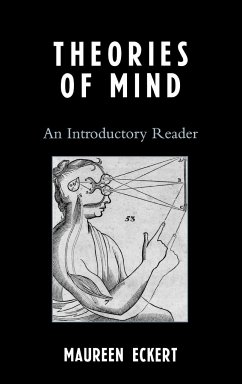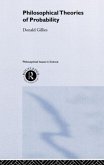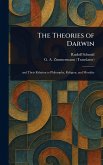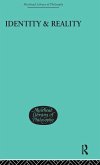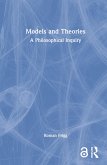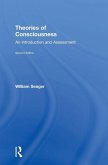Theories of Mind
An Introductory Reader
Herausgeber: Eckert, Maureen
Theories of Mind
An Introductory Reader
Herausgeber: Eckert, Maureen
- Gebundenes Buch
- Merkliste
- Auf die Merkliste
- Bewerten Bewerten
- Teilen
- Produkt teilen
- Produkterinnerung
- Produkterinnerung
Intended for introductory classes focusing on philosophy of mind, Theories of Mind includes readings from primary sources, edited to suit the needs of the beginner. Edited selections focus on vivid examples and counter-examples, and meet the needs of instructors concerned with assigning accessible primary source material that can serve as a foundation for more advanced studies in philosophy.
Andere Kunden interessierten sich auch für
![Taking Conspiracy Theories Seriously Taking Conspiracy Theories Seriously]() Taking Conspiracy Theories Seriously134,99 €
Taking Conspiracy Theories Seriously134,99 €![Philosophical Theories of Probability Philosophical Theories of Probability]() Donald GilliesPhilosophical Theories of Probability176,99 €
Donald GilliesPhilosophical Theories of Probability176,99 €![The Theories of Darwin The Theories of Darwin]() Rudolf SchmidThe Theories of Darwin31,99 €
Rudolf SchmidThe Theories of Darwin31,99 €![Identity & Reality Identity & Reality]() Emile MeyersonIdentity & Reality231,99 €
Emile MeyersonIdentity & Reality231,99 €![Models and Theories Models and Theories]() Roman FriggModels and Theories169,99 €
Roman FriggModels and Theories169,99 €![Theories of Consciousness Theories of Consciousness]() William SeagerTheories of Consciousness203,99 €
William SeagerTheories of Consciousness203,99 €![Life Theories Life Theories]() Lionnel BeäleLife Theories28,99 €
Lionnel BeäleLife Theories28,99 €-
-
-
Intended for introductory classes focusing on philosophy of mind, Theories of Mind includes readings from primary sources, edited to suit the needs of the beginner. Edited selections focus on vivid examples and counter-examples, and meet the needs of instructors concerned with assigning accessible primary source material that can serve as a foundation for more advanced studies in philosophy.
Produktdetails
- Produktdetails
- Verlag: Rowman & Littlefield Publishers
- Seitenzahl: 284
- Erscheinungstermin: 11. August 2006
- Englisch
- Abmessung: 235mm x 157mm x 21mm
- Gewicht: 615g
- ISBN-13: 9780742550629
- ISBN-10: 0742550621
- Artikelnr.: 22332487
- Herstellerkennzeichnung
- Libri GmbH
- Europaallee 1
- 36244 Bad Hersfeld
- gpsr@libri.de
- Verlag: Rowman & Littlefield Publishers
- Seitenzahl: 284
- Erscheinungstermin: 11. August 2006
- Englisch
- Abmessung: 235mm x 157mm x 21mm
- Gewicht: 615g
- ISBN-13: 9780742550629
- ISBN-10: 0742550621
- Artikelnr.: 22332487
- Herstellerkennzeichnung
- Libri GmbH
- Europaallee 1
- 36244 Bad Hersfeld
- gpsr@libri.de
Maureen Eckert is assistant professor of philosophy at the University of Massachusetts, Dartmouth. She is co-editor of Philosophical Horizons: Introductory Readings and Knowledge and Reality: Classic and Contemporary Readings
Part 1 Introduction
Part 2 Section 1: Substance Dualism and Gilbert Ryle's Critique
Chapter 3 Descartes, Principles of Philosophy, selections
Chapter 4 Gilbert Ryle, Concept of Mind, selection from chapter 1 and
selection from chapter 2
Chapter 5 Jerry Fodor, "Logical Behaviorism" selection from Language of
Thought
Part 6 Section 2: Three Theories of Mind
Part 7 Type Identity
Chapter 8 J.J.C. Smart, "Sensations and Brain Processes," selection
Part 9 Functionalism
Chapter 10 Alan Turing, "Computing Machinery and Intelligence," selection
Chapter 11 David Lewis, "Psychophysical and Theoretical Identifications,"
selection
Chapter 12 Jerry A. Fodor, "The Mind-Body Problem"
Chapter 13 Ned Block, "Troubles with Functionalism," selection
Chapter 14 Frank Jackson, "Epiphenomenal Quailia"
Part 15 Eliminative Materialism
Chapter 16 Paul Churchland, "Eliminativism" from Matter and Consciousness
Chapter 17 Daniel C. Dennett, selection from "True Believers: The
Intentional Strategy and Why it Works"
Chapter 18 Andy Clark, "I am John's Brain"
Part 19 Section 3: Artificial Intelligence
Chapter 20 John Searle, "Is the Mind's Brain a Computer Program?"
Chapter 21 Paul and Patricia Churchland, "Could a Machine Think?"
22 Daniel C. Dennett: "On the Practical Requirements of Making a Conscious
Robot"
Part 23 Section 4: Consciousness
Part 24 Subjectivity/Objectivity
Chapter 25 Thomas Nagel, "What is it Like to Be a Bat?"
Chapter 26 Keith Gunderson, "Asymmetries and Mind-Body Perplexities,"
selection
Chapter 27 David Lewis, "On Knowing What it's Like"
Part 28 Theories of Consciousness
Chapter 29 David Armstrong, "What is Consciousness?"
Chapter 30 David Chalmers, "Facing Up to the Problem of Consciousness"
Chapter 31 Barbara Montero, "Rethinking the Mind-Body Problem"
Part 2 Section 1: Substance Dualism and Gilbert Ryle's Critique
Chapter 3 Descartes, Principles of Philosophy, selections
Chapter 4 Gilbert Ryle, Concept of Mind, selection from chapter 1 and
selection from chapter 2
Chapter 5 Jerry Fodor, "Logical Behaviorism" selection from Language of
Thought
Part 6 Section 2: Three Theories of Mind
Part 7 Type Identity
Chapter 8 J.J.C. Smart, "Sensations and Brain Processes," selection
Part 9 Functionalism
Chapter 10 Alan Turing, "Computing Machinery and Intelligence," selection
Chapter 11 David Lewis, "Psychophysical and Theoretical Identifications,"
selection
Chapter 12 Jerry A. Fodor, "The Mind-Body Problem"
Chapter 13 Ned Block, "Troubles with Functionalism," selection
Chapter 14 Frank Jackson, "Epiphenomenal Quailia"
Part 15 Eliminative Materialism
Chapter 16 Paul Churchland, "Eliminativism" from Matter and Consciousness
Chapter 17 Daniel C. Dennett, selection from "True Believers: The
Intentional Strategy and Why it Works"
Chapter 18 Andy Clark, "I am John's Brain"
Part 19 Section 3: Artificial Intelligence
Chapter 20 John Searle, "Is the Mind's Brain a Computer Program?"
Chapter 21 Paul and Patricia Churchland, "Could a Machine Think?"
22 Daniel C. Dennett: "On the Practical Requirements of Making a Conscious
Robot"
Part 23 Section 4: Consciousness
Part 24 Subjectivity/Objectivity
Chapter 25 Thomas Nagel, "What is it Like to Be a Bat?"
Chapter 26 Keith Gunderson, "Asymmetries and Mind-Body Perplexities,"
selection
Chapter 27 David Lewis, "On Knowing What it's Like"
Part 28 Theories of Consciousness
Chapter 29 David Armstrong, "What is Consciousness?"
Chapter 30 David Chalmers, "Facing Up to the Problem of Consciousness"
Chapter 31 Barbara Montero, "Rethinking the Mind-Body Problem"
Part 1 Introduction
Part 2 Section 1: Substance Dualism and Gilbert Ryle's Critique
Chapter 3 Descartes, Principles of Philosophy, selections
Chapter 4 Gilbert Ryle, Concept of Mind, selection from chapter 1 and
selection from chapter 2
Chapter 5 Jerry Fodor, "Logical Behaviorism" selection from Language of
Thought
Part 6 Section 2: Three Theories of Mind
Part 7 Type Identity
Chapter 8 J.J.C. Smart, "Sensations and Brain Processes," selection
Part 9 Functionalism
Chapter 10 Alan Turing, "Computing Machinery and Intelligence," selection
Chapter 11 David Lewis, "Psychophysical and Theoretical Identifications,"
selection
Chapter 12 Jerry A. Fodor, "The Mind-Body Problem"
Chapter 13 Ned Block, "Troubles with Functionalism," selection
Chapter 14 Frank Jackson, "Epiphenomenal Quailia"
Part 15 Eliminative Materialism
Chapter 16 Paul Churchland, "Eliminativism" from Matter and Consciousness
Chapter 17 Daniel C. Dennett, selection from "True Believers: The
Intentional Strategy and Why it Works"
Chapter 18 Andy Clark, "I am John's Brain"
Part 19 Section 3: Artificial Intelligence
Chapter 20 John Searle, "Is the Mind's Brain a Computer Program?"
Chapter 21 Paul and Patricia Churchland, "Could a Machine Think?"
22 Daniel C. Dennett: "On the Practical Requirements of Making a Conscious
Robot"
Part 23 Section 4: Consciousness
Part 24 Subjectivity/Objectivity
Chapter 25 Thomas Nagel, "What is it Like to Be a Bat?"
Chapter 26 Keith Gunderson, "Asymmetries and Mind-Body Perplexities,"
selection
Chapter 27 David Lewis, "On Knowing What it's Like"
Part 28 Theories of Consciousness
Chapter 29 David Armstrong, "What is Consciousness?"
Chapter 30 David Chalmers, "Facing Up to the Problem of Consciousness"
Chapter 31 Barbara Montero, "Rethinking the Mind-Body Problem"
Part 2 Section 1: Substance Dualism and Gilbert Ryle's Critique
Chapter 3 Descartes, Principles of Philosophy, selections
Chapter 4 Gilbert Ryle, Concept of Mind, selection from chapter 1 and
selection from chapter 2
Chapter 5 Jerry Fodor, "Logical Behaviorism" selection from Language of
Thought
Part 6 Section 2: Three Theories of Mind
Part 7 Type Identity
Chapter 8 J.J.C. Smart, "Sensations and Brain Processes," selection
Part 9 Functionalism
Chapter 10 Alan Turing, "Computing Machinery and Intelligence," selection
Chapter 11 David Lewis, "Psychophysical and Theoretical Identifications,"
selection
Chapter 12 Jerry A. Fodor, "The Mind-Body Problem"
Chapter 13 Ned Block, "Troubles with Functionalism," selection
Chapter 14 Frank Jackson, "Epiphenomenal Quailia"
Part 15 Eliminative Materialism
Chapter 16 Paul Churchland, "Eliminativism" from Matter and Consciousness
Chapter 17 Daniel C. Dennett, selection from "True Believers: The
Intentional Strategy and Why it Works"
Chapter 18 Andy Clark, "I am John's Brain"
Part 19 Section 3: Artificial Intelligence
Chapter 20 John Searle, "Is the Mind's Brain a Computer Program?"
Chapter 21 Paul and Patricia Churchland, "Could a Machine Think?"
22 Daniel C. Dennett: "On the Practical Requirements of Making a Conscious
Robot"
Part 23 Section 4: Consciousness
Part 24 Subjectivity/Objectivity
Chapter 25 Thomas Nagel, "What is it Like to Be a Bat?"
Chapter 26 Keith Gunderson, "Asymmetries and Mind-Body Perplexities,"
selection
Chapter 27 David Lewis, "On Knowing What it's Like"
Part 28 Theories of Consciousness
Chapter 29 David Armstrong, "What is Consciousness?"
Chapter 30 David Chalmers, "Facing Up to the Problem of Consciousness"
Chapter 31 Barbara Montero, "Rethinking the Mind-Body Problem"

